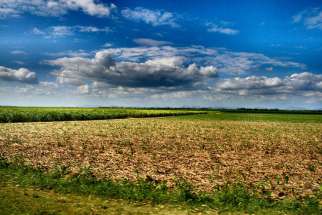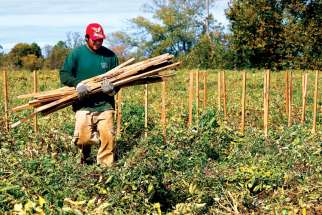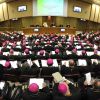Migrants in a ‘perpetual Good Friday’
TORONTO - On the sugar cane plantations in the Dominican Republic, life is bitter for the Haitian migrants who farm the land.
Two bills under consideration in Ontario that seek to expand protection for migrant workers are “doomed” because they don’t address the real thing these workers need, a means of staying here, says Stan Raper.
Pope says faith and hope are foundation of migrants' journeys
VATICAN CITY - Migrants usually are forced to leave their countries because of poverty, hunger or violence, but faith and hope help them face their hardships and seek a better life elsewhere, Pope Benedict XVI said.
The pope chose "Migrations: pilgrimage of faith and hope" as the theme for the 2013 celebration of the World Day of Migrants and Refugees, and issued a message that touched on many facets of what he called a "striking phenomenon" that raises "dramatic challenges."
The Vatican released the message Oct. 29, on the heels of the three weeklong Synod of Bishops on the new evangelization, which brought together church leaders from around the world to discuss efforts to strengthen the faith of Catholics and bring lapsed Catholics back.
"Faith and hope are inseparable in the hearts of many migrants, who deeply desire a better life and not infrequently try to leave behind the 'hopelessness' of an unpromising future," Pope Benedict wrote.
The pope's message was introduced in a news conference at the Vatican by Cardinal Antonio Maria Veglio and Bishop Joseph Kalathiparambil, respectively, president and secretary of the Pontifical Council for Migrants and Travelers.
Migration by its nature involves suffering the pain of uprooting and separation from family, country and possessions, the pope said, but faith and hope allow those who emigrate to face a difficult present if they can believe it will lead to a better future.
They are not just seeking to improve their financial, social or political condition, the pope said. People who leave their native countries are hoping to "encounter acceptance, solidarity and help" from those in their new country who can recognize the values and resources they have to offer, he said.
The Catholic Church, he said, is a witness to the "immense poverty and suffering entailed in migration" that often leads to "painful and tragic situations." The church is on the ground with its various agencies to assist migrants, refugees and asylum seekers in emergencies and in beginning their new lives.
Church agencies, he said, should not forget the religious dimension of the migrants' lives and "must devote special attention and care" to their spiritual needs.
Ecumenical dialogue is important for assisting other Christians, he said, and even with Catholic immigrants, it may mean accommodating the faithful of various rites.
Migrants and refugees who are guests have the right to expect solidarity, but they also have the responsibility to abide by the rules of the host country, he said.
The pope also spoke about the plague of human trafficking, and said that better immigration policies in the wealthier countries could help in combating the various forms of exploitation that illegal immigrants often face. Those policies, he said, should not, however, lead to "a hermetic sealing of borders" or simply adopting measures that discourage immigrants.
Cardinal Veglio emphasized the need to treat migrants and refugees with warmth and respect, and he said their integration must be accompanied by proper regulations, both international and domestic.
Bishop Kalathiparambil spoke of the extreme difficulties faced by refugees and those asking for political asylum, who often leave their countries "because of innumerable violations of their human rights and because of the cruelty of bloody conflicts."
He illustrated how refugees often are forced to put their lives in the hands of traffickers, who, once they have taken great sums money to bring them across the sea or to other destinations, continue to exploit them as forced laborers or sex workers.
Refugees must have the opportunity to become part of the new society to which they have escaped, where they have "great potential to bear witness and evangelize," the bishop said.
In most parts of the world, the Catholic Church celebrates the World Day of Migrants and Refugees Jan. 13, while the United Nations marks it on Dec. 18. In the United States, the U.S. Conference of Catholic Bishops marks National Migration Week Jan. 6-12.




